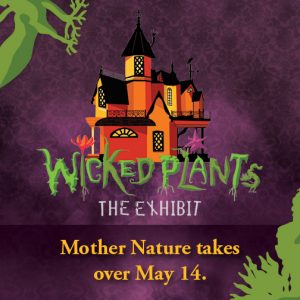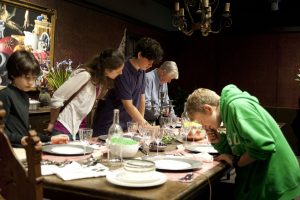 GAINESVILLE, Fla. —While the effects of marijuana, mushrooms and poison ivy are fairly well-known, many people may be surprised to learn about the potential danger of common plants in and around their homes.
GAINESVILLE, Fla. —While the effects of marijuana, mushrooms and poison ivy are fairly well-known, many people may be surprised to learn about the potential danger of common plants in and around their homes.
And beginning May 14, Florida Museum of Natural History visitors will learn about the power that plants hold in its newest featured exhibit, “Wicked Plants: The Exhibit.”
The exhibit features more than 100 plants and is designed to educate guests about botanicals that are harmful to humans and animals, including evildoers lurking in the home and backyard. The story is brought to life inside an old home, where visitors will encounter a deadly dinner in the dining room, terrible toxins in the parlor, social misfits in the bathroom and a crime scene in the laboratory.
“Exhibits about plants are very uncommon, even though our lives and sometimes our deaths are intimately connected to the world of plants,” said Darcie MacMahon,

Florida Museum exhibits and public programs director. “This exhibit is a great way to have fun learning while also coming to appreciate the darker side of plant-human interactions.”
Sniffing stations, audio visuals and interactive components allow guests to experience everything from foul smells to psychotropic plants without the risk of intoxication, addiction, dismemberment or other danger. The exhibit features two- and three-dimensional interactives and uses an open-ended learning style.
“Wicked Plants” provides insight into the bio-chemical, physical and neurological processes between plants and the human body. The exhibit identifies plants associated with a multitude of negative health effects, including addiction, obesity, allergies, pain, poisoning, cognitive impairment, organ failure, brain disorders and death.
The museum will also have an ongoing scavenger hunt for wicked plants in “Northwest Florida: Waterways and Wildlife,” “South Florida People and Environments,” the “Butterfly Rainforest,” the Fossil Plant Garden and the Florida Wildflower and Butterfly Garden.
“You’d be amazed by how many plants in our gardens and Florida in general are wicked,” MacMahon said. “We’ll all look at our landscapes in a whole new way.”
The opening celebration on Saturday, May 14 from 10 a.m. to 3 p.m. includes the opportunity for visitors to solve a murder mystery and explore activity stations.
The exhibit is based on Amy Stewart’s 2009 book “Wicked Plants: The Weed That Killed Lincoln’s Mother and Other Botanical Atrocities.” Stewart will speak and sign books at a members-only reception on May 21 from 7 to 8:30 p.m. To find out how to become a member, visit www.floridamuseum.ufl.edu/membership.
While opening day activities are free, admission to “Wicked Plants” is $7.50 for adults ($6.50 for Florida residents, seniors and college students); $4.50 for ages 3-17 and free to museum members and University of Florida students with a valid Gator 1 card.
The Florida Museum will display “Wicked Plants” through Jan. 15, 2017. The exhibit is funded by the North Carolina Arboretum Society and the Creel-Harison Foundation with contributions from the 150th Anniversary Cultural Plaza Endowment.
For more information, visit www.floridamuseum.ufl.edu/wickedplants.
-30-
Writer: Elizabeth Brown, ebrown@flmnh.ufl.edu
Source: Darcie MacMahon, 352-273-2053, dmacmahon@flmnh.ufl.edu
Contact: Paul Ramey, 352-273-2054, pramey@flmnh.ufl.edu